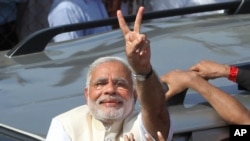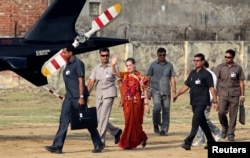NEW DELHI —
In India, opposition prime ministerial candidate Narendra Modi and ruling Congress Party leader Sonia Gandhi were among the contestants in polling Wednesday in India's national election. As the electoral battle for a new government enters its final stages, the contestants are pushing hard to gather votes.
Despite soaring summer temperatures, enthusiastic crowds turned out to vote in the western state of Gujarat, the home state of Bharatiya Janata Party prime ministerial candidate Narendra Modi.
After casting his vote in a school in Ahmedabad city early Wednesday, Modi flashed victory signs to cheering supporters. The man who polls said could be India’s next prime minister exuded confidence, saying the elections will end the rule of Congress Party President Sonia Gandhi and her son, Rahul Gandhi.
Modi told reporters he has gauged voters’ mood with his own eyes.
The opposition leader said nothing can save the mother-son government. He said polls held so far have set the foundation of a new, strong government.
However, the BJP leader sparked controversy, flashing his party symbol, lotus, and giving a speech after voting. Following complaints from his opponents, the Election Commission ordered action against Modi for violating the code of conduct, which does not allow canvassing outside places where polling is taking place.
The Hindu nationalist leader is contesting from two seats - Vadodara in Gujarat and the Hindu holy city of Varanasi in Uttar Pradesh.
Gujarat was among nine states and territories in which 89 constituencies went to the polls Wednesday.
These included the Rae Bareli constituency in Uttar Pradesh, from where the top Congress Party leader, Sonia Gandhi is contesting.
With the Congress Party’s fortunes appearing to wane, Sonia Gandhi’s daughter, Priyanka Vadra, has joined the poll campaign in recent days to revive the party’s fortunes.
The Nehru-Gandhi political dynasty has dominated Indian politics since independence from Britain in 1947. But political analysts say Rahul Gandhi, who was catapulted to prominence in this election, is a lackluster campaigner and has failed to halt Modi's momentum. On the other hand, observers say his sister is more charismatic, and connects much better with voters.
Priyanka Vadra campaigned on Wednesday in Amethi in Uttar Pradesh state, from where her brother, Rahul Gandhi, is contesting.
She told voters Rahul Gandhi has a forward-looking vision that will bring development to the area such as roads to boost business and new train connections.
The Gandhi family’s newest campaigner has been countering Modi by calling the election a fight to protect India’s secular identity. It is a reference to concerns that the Hindu nationalist leader is divisive, an allegation he has faced since 2002, when his state was wracked by sectarian rioting.
The BJP, in turn, has pointed to Vadra’s husband, who is alleged to have amassed a fortune in property transactions in recent years due to his political connections. The Congress Party’s waning support is partly due to allegations that corruption flourished under its rule.
Political analysts said the campaign is becoming increasingly shrill as both sides pull out all stops for the two remaining stages of the mammoth, nine-stage poll, which ends on May 12.
Despite soaring summer temperatures, enthusiastic crowds turned out to vote in the western state of Gujarat, the home state of Bharatiya Janata Party prime ministerial candidate Narendra Modi.
After casting his vote in a school in Ahmedabad city early Wednesday, Modi flashed victory signs to cheering supporters. The man who polls said could be India’s next prime minister exuded confidence, saying the elections will end the rule of Congress Party President Sonia Gandhi and her son, Rahul Gandhi.
Modi told reporters he has gauged voters’ mood with his own eyes.
The opposition leader said nothing can save the mother-son government. He said polls held so far have set the foundation of a new, strong government.
However, the BJP leader sparked controversy, flashing his party symbol, lotus, and giving a speech after voting. Following complaints from his opponents, the Election Commission ordered action against Modi for violating the code of conduct, which does not allow canvassing outside places where polling is taking place.
The Hindu nationalist leader is contesting from two seats - Vadodara in Gujarat and the Hindu holy city of Varanasi in Uttar Pradesh.
Gujarat was among nine states and territories in which 89 constituencies went to the polls Wednesday.
These included the Rae Bareli constituency in Uttar Pradesh, from where the top Congress Party leader, Sonia Gandhi is contesting.
With the Congress Party’s fortunes appearing to wane, Sonia Gandhi’s daughter, Priyanka Vadra, has joined the poll campaign in recent days to revive the party’s fortunes.
The Nehru-Gandhi political dynasty has dominated Indian politics since independence from Britain in 1947. But political analysts say Rahul Gandhi, who was catapulted to prominence in this election, is a lackluster campaigner and has failed to halt Modi's momentum. On the other hand, observers say his sister is more charismatic, and connects much better with voters.
Priyanka Vadra campaigned on Wednesday in Amethi in Uttar Pradesh state, from where her brother, Rahul Gandhi, is contesting.
She told voters Rahul Gandhi has a forward-looking vision that will bring development to the area such as roads to boost business and new train connections.
The Gandhi family’s newest campaigner has been countering Modi by calling the election a fight to protect India’s secular identity. It is a reference to concerns that the Hindu nationalist leader is divisive, an allegation he has faced since 2002, when his state was wracked by sectarian rioting.
The BJP, in turn, has pointed to Vadra’s husband, who is alleged to have amassed a fortune in property transactions in recent years due to his political connections. The Congress Party’s waning support is partly due to allegations that corruption flourished under its rule.
Political analysts said the campaign is becoming increasingly shrill as both sides pull out all stops for the two remaining stages of the mammoth, nine-stage poll, which ends on May 12.





